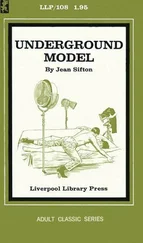Warren nodded. He put the glass down on the counter.
“He’s a Jesus impersonator,” she said.
“A Jesus impersonator?”
“Parades, videos, that sort of thing.”
“Wow,” Warren said.
“He’s in Salt Lake right now, doing a gig for the Latter-Day Saints.” Melody nodded at the picture on the fridge. “That’s a joke. Anyway, his idea of one. He doesn’t really do glamour shots.”
Warren might have laughed, but he was too dejected. Things were not looking promising. Nevertheless, he plunked his case on the kitchen table and began to unzip it.
“I’m sorry my dad got you all the way out here,” Melody said casually. “But we don’t need any knives.”
“Do you mind if I just go through my pitch?”
“Won’t do any good, I promise.”
“This is my first day,” he lied.
“I’ve got to fix the antenna before Dad wakes up. He can’t get his shows.”
“I could really use the practice.”
She studied him resentfully and then sat down in a chair, fiddling with the shard of pottery dangling from her neck. Warren guessed she was in her mid-thirties, a pretty much hopeless demographic when it came to moving knives. The hopelessness was compounded by the fact that she still lived with her father. Warren tried to forget these things as he threw himself into his sales pitch, withdrawing a tomato knife from his case and describing the “patented edge” that never touched the cutting board, only the tomato, thereby requiring no sharpening at all. Contrary to popular opinion, dull knives were much more dangerous than sharp ones. “Did you know that more people lose their fingers every year from cooking with old knives than from working in factories?”
“All of them?”
“What?”
“‘Fingers,’ you said. I’m picturing someone with no digits.”
Warren looked at her. “Fin ger . Sorry.”
“Since you’re practicing.”
He passed her the knife so she could feel the patented, form-fitting grip for herself. She did not seem particularly impressed. He explained that BladeCo’s patented handle was guaranteed to withstand temperatures of up to 850 degrees Fahrenheit, more than twice as hot as the average flame. It was the same material, in fact, that was developed for the space shuttle.
“Are you sure you want to mention the space shuttle?” she said.
“Why not?”
“I mean, it blew up.”
“That’s true, but the knives were in perfect condition.” He took the tomato knife back, feeling sick to his stomach. “Sorry. A little joke.”
“I don’t think that’s appropriate. To joke about a disaster like that. Personally, I’m not offended, but it’s not going to endear you to the customer.”
Who was this woman? She had something in her hair — a twig — as though she’d just emerged from a tent. Warren wondered if she was insane. “What do you suggest I say instead?”
“You could mention a factoid.”
“A factoid?”
“A factoid’s a small, insignificant fact. Kind of like your thing about fingers. For instance, were you aware that bats always turn left when exiting a cave?”
Warren shook his head.
“I don’t know how you could work that in — to your pitch, I mean — but it might liven things up.”
Warren could see that the first-time angle wasn’t working but did not know how to cut short his pitch. He found a cutting board by the sink and asked for something to chop. Melody brought him a carrot, which he began to slice into perfect orange poker chips. He’d practiced this many times and was secretly proud of his knifemanship. As he was blazing through the carrot, flourishing the knife like a chef — trying, for some odd reason, to impress her — the blade slipped and caught his finger. A deep gash, just above the joint. It closed up almost immediately before beginning to pool with blood.
Warren pressed the gash with his thumb, trying to staunch the flow. The amount of blood surprised him. He grabbed the cutting board with his uninjured hand, hoping to dump the bloodied carrot down the disposal.
“What is that?” Melody said from her chair.
“There must have been ketchup or something on the cutting board.” Warren’s finger had begun to throb, pulsing a half beat behind his heart. He wondered if he should go to the hospital.
“My father,” she said, shaking her head. “You should see what he eats. He puts margarine and butter on his English muffins. I’m always, like, one’s a butter substitute, it defeats the purpose, you can’t substitute a butter that’s already there! If you’re coaching a basketball team, do you put in a player without taking one out? But he likes the taste.” She leaned forward, squinting at Warren’s hand. “Hey, look. There’s blood running down your wrist.”
“It’s nothing,” he said.
“Did you know that Attila the Hun died from a nosebleed, on his wedding night?”
Warren pressed his tie against the wound, hoping the absor bency would help. The blue tie bloomed purple, a broad stain creeping upward like a thermometer.
“Wow, that’s nastier than I thought,” Melody said. “Sit down. I’ll get the first aid kit.”
Warren did as he was told, slumping into a chair. He was feeling a bit woozy. When Dustin was a kid, he’d get excited over the smallest bruise or scratch, barging into the house and demanding a Band-Aid like a biker ordering a drink. Warren could picture the euphoric swagger of his walk. Returning to the kitchen, Melody unbuckled an old tackle box and pulled out a gauze pad and pressed it to his finger hard enough to hurt. She lifted his arm above his heart, to “elevate the wound.” Despite the twig in her hair, she seemed to know what she was doing. The shard of pottery around her neck dangled near Warren’s face.
“What’s on your necklace?” he couldn’t help asking.
“My skull. A piece of it, I mean. The doctor asked if I wanted to keep it, you know, for a memento.”
“Doctor?”
“Surgeon, actually.”
“You had an operation?”
“Craniotomy.” She glanced at him for a second, as if he might challenge this. “Brain tumor.”
Warren felt a vague tug of hope. “My father had a brain tumor,” he said.
“Was it benign?”
“No. I don’t think so. He died when I was seven.”
“Probably an astrocytoma,” Melody said. “Actually, there are no benign ones. They just call them that, to classify them, but they can still kill you.” She looked down at her necklace. “I just wear it to remind me, you know, where I’ve been.”
Warren peered at the shard of skull. There was an intimacy about it that seemed somehow comforting. Something about the way she was holding him, cradling his elbow and gripping his index finger like a baby, compounded this feeling.
“I lied,” he said. “This isn’t my first day on the job.”
“I know,” Melody said.
“You do? Why were you critiquing my pitch?”
She shrugged. “You don’t often get the opportunity,” she said thoughtfully. “Oh, great. Dad’s up. I just heard his door.”
A man with bushy eyebrows entered the kitchen, wearing paja mas and no teeth. You could see Melody’s face in him like a dirty joke. She introduced Warren, explaining why he was there. The man’s eyes took in the scene in front of him — Melody holding Warren’s arm over his head, the first aid kit open on the table — before moving to Warren’s shirt, which was covered extravagantly in blood.
“Make sure you get the free spatula,” he said before leaving the kitchen.
“I wish all my customers were like that,” Warren said.
“He’ll buy anything,” Melody said, “so long as he gets something free.”
Warren laughed. The noise — his own laughter — sounded foreign to him. “Has it stopped bleeding?” he said, looking at his finger. His whole arm was asleep.
Читать дальше












